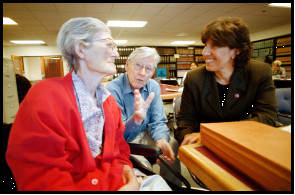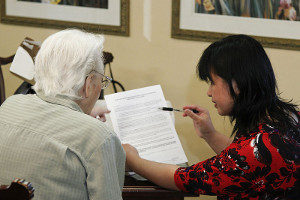 This is a continuing series using information from the booklet written by the National Institute on Aging working with the National Institutes of Health called: Talking with Your Doctor. (U.S. Department of Health and Human Services, NIH Publication No. 05-3452 August 2005. Reprinted April 2010.)
This is a continuing series using information from the booklet written by the National Institute on Aging working with the National Institutes of Health called: Talking with Your Doctor. (U.S. Department of Health and Human Services, NIH Publication No. 05-3452 August 2005. Reprinted April 2010.)
For many, it’s hard to discuss topics like depression, grief, family issues, incontinence, and alcohol use with their doctor. It may feel awkward to bring up such personal matters. The fact is, though, that doctors are used to talking about these things with their patients. After all, the very nature of the doctor-patient relationship is personal. Let’s take a look at some of the subjects you may hesitate to bring up.
Depression and Grief
One of the most difficult aspects of growing older is facing the loss of your spouse, friends, and other important people in your life. This would be tough at any age, but can be even more significant at an older age when the losses are compounded.
Mourning is normal, but clinical depression is not. Take note when feelings of sadness are constant, last more than a few weeks, are accompanied by poor or increased appetite, and lack of energy. If this applies to you, it’s time to talk to your doctor. As the booklet says, “A doctor who knows about your losses is better able to understand how you are feeling. He or she can make suggestions that may be helpful to you.”
Problems with Family
Another issue that can cause emotional distress is difficulty with your family. Age and illness can bring severe stress to any family, even those who are normally very loving. You may feel that family issues should be kept private. Remember, though, that your doctor is trained to offer you valuable assistance in these areas. If you feel you’re being abused emotionally, physically, verbally, or even financially – speak up!
Falling, Incontinence, and Memory Problems
Since falling can be very serious for an older person, many develop a real fear of it. It could prevent them from doing the things they usually enjoy, or from trying new activities. However, you can become weaker and frailer through this, hence increasing your chances of actually falling! Gentle and specific exercises can help, and your doctor can advise you about these.
Incontinence is an embarrassing subject for many. You may be surprised to learn that there are many useful exercises and medications to assist you in controlling your bladder. Don’t hesitate to ask your doctor for help because of fear of embarrassment. It’s worth it to improve your quality of life!
It’s not uncommon to experience some issues with memory as you age. That doesn’t make it any less distressing, however. The booklet assures you, “For most older adults, thinking and memory remain relatively intact in later years.” If you or your family members do notice a change in function, be specific when talking to you doctor about it. Tell them which parts of your life it’s affecting. There’s no reason you should suffer in silence.
Alcohol and Sexuality
These two matters are especially sensitive for many. Alcohol moderation is important, though, because the effects on a person may change or increase in later years. Depression and loss, discussed earlier, can even contribute to one misusing alcohol as a coping mechanism. One way to bring this up, the booklet suggests, is by saying something like, “Lately I’ve been wanting to have a drink earlier and earlier in the afternoon and I find it’s getting harder to stop after just one or two. What kind of treatments could help with this?”
Some assume that aging means sexuality will decrease or worsen. This doesn’t need to be the case! Many have a healthy sex life long into their later years. Most doctors recognize this. If you aren’t satisfied with your sex life, it could be because of a medication or disability. Don’t be shy bringing this up. Let them know you have a personal question to lead into the topic. Be assured they’ll be very understanding.
It’s important to have a doctor you can discuss these sensitive topics with. What if you’re uncomfortable with yours? Try being direct with them. Tell them your issue and how it makes you feel. Misunderstandings happen, and communication fosters trust. If you truly don’t feel satisfied, though, it may be time to look for a new one. Your comfort matters, and you need support while coping with these changes.










